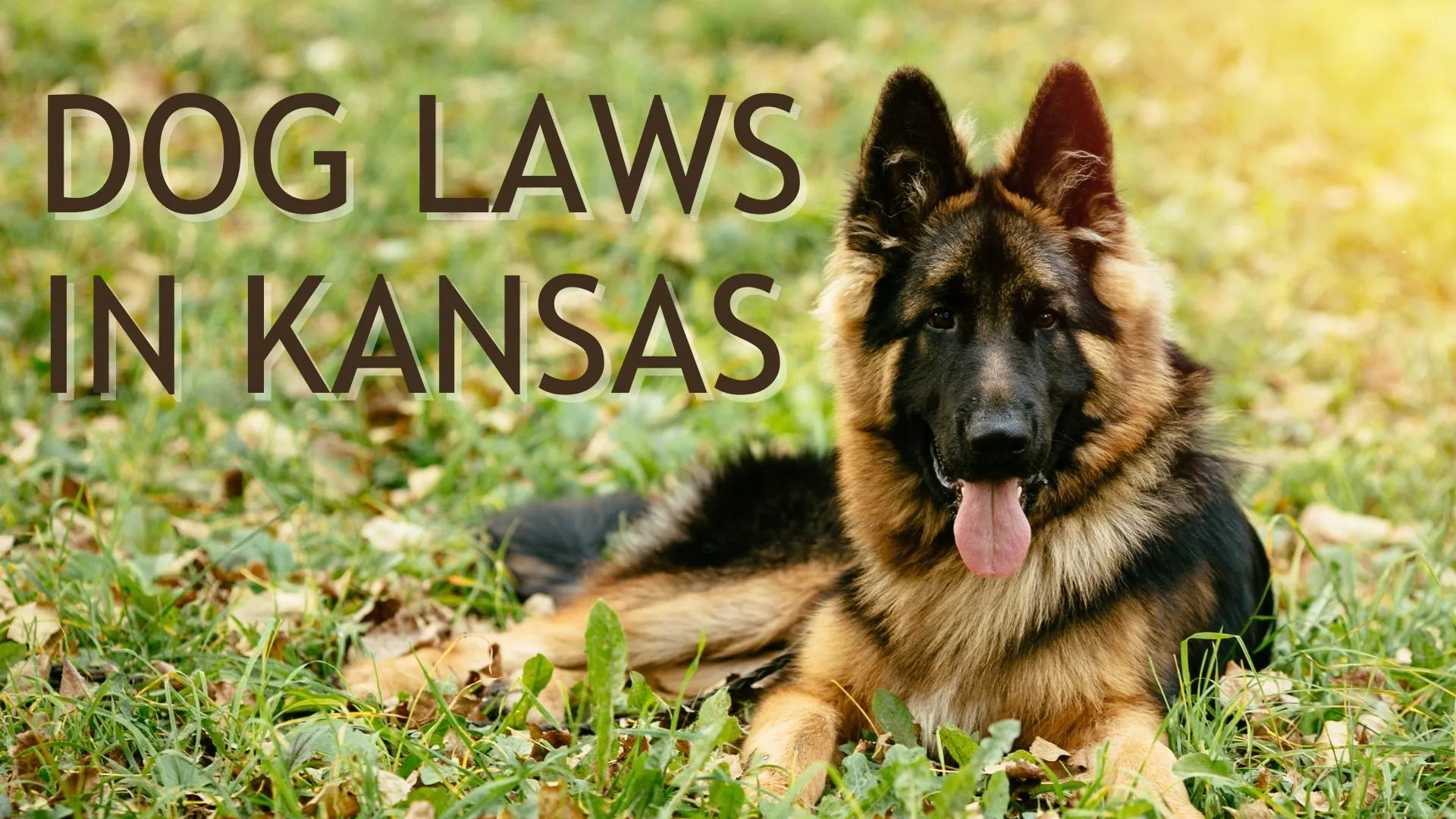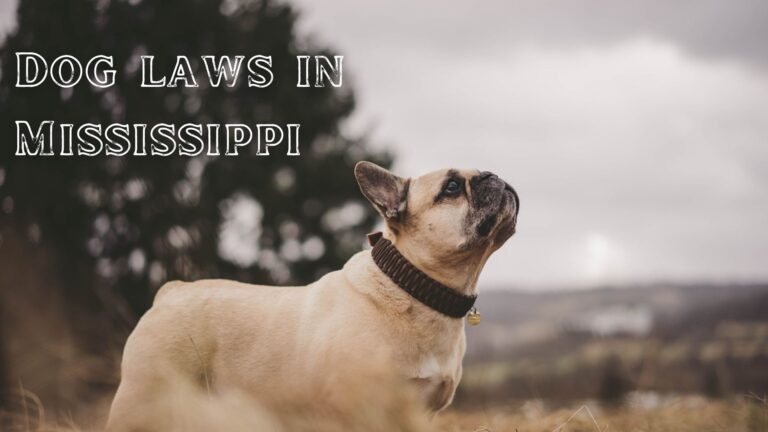Dog Laws in Kansas
Navigating the intricate web of Dog Laws in Kansas is crucial for responsible pet ownership. In the Sunflower State, where at least 194 municipalities mandate rabies vaccinations, understanding local statutes is not just about compliance—it’s about safeguarding the community and our beloved companions. From the “one-bite” rule that governs dog bite liability to the nuanced definitions of animal cruelty, Kansas law covers a broad spectrum of issues that affect our four-legged friends.
As a veterinarian deeply invested in the welfare of animals, I’ve witnessed firsthand the consequences of ignorance and misinformation. Whether it’s the debate over breed-specific legislation or the protocols following a dog bite incident, each statute reflects a commitment to public safety and animal welfare. It’s a narrative woven with legal threads that protect, define, and sometimes challenge our views on pet ownership and responsibility.
Table of Contents
Dog Bite Laws in Kansas
Kansas dog bite laws operate under the “one-bite rule,” which holds dog owners accountable for injuries caused by their dogs if they knew or should have known about their dog’s aggressive tendencies. This rule is particularly significant in Kansas, where dog owners are strictly liable for any harm their pets cause, regardless of the dog’s previous behavior.
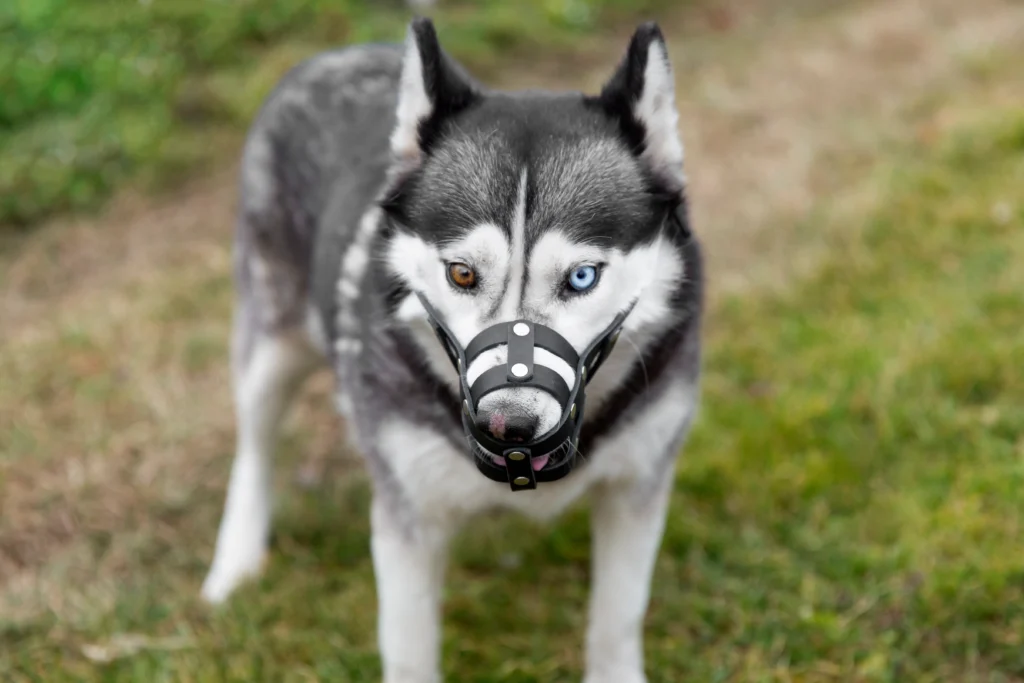
Strict Liability and the One-Bite Rule
In Kansas, the one-bite rule imposes strict liability on dog owners. This means that if a dog has previously bitten someone or shown signs of aggression, the owner is automatically responsible for any subsequent injuries the dog may cause. This approach emphasizes the importance of responsible pet ownership and the need for owners to be aware of their dog’s behavior.
Statute of Limitations
Victims of dog bites in Kansas have two years from the date of the incident to file a lawsuit. This statute of limitations is crucial for ensuring that victims take timely legal action to seek compensation for their injuries.
Defenses for Dog Owners
Kansas law provides certain defenses for dog owners in bite cases. These include trespassing, provocation, and comparative negligence. If a victim provoked the dog or was trespassing at the time of the bite, the owner might argue for reduced liability.
Local Regulations and Dangerous Dogs
Municipalities in Kansas may have additional ordinances that address dangerous dogs, such as leash laws and confinement requirements. Dog owners must comply with both state and local regulations to prevent incidents and ensure community safety.
Compensation for Victims
Dog bite victims may be entitled to compensation for medical expenses, pain and suffering, lost wages, and property damage. It’s advisable for victims to consult with a personal injury attorney to navigate the legal process and determine the appropriate compensation.
Dog Barking and Noise Laws in Kansas
In Kansas, there is no statewide legal duration for how long a dog can bark. However, the overarching principle is that dogs should not become a public nuisance. A dog’s barking is considered a nuisance if it is prolonged and neighbors can testify to its disturbance under oath.

No Statewide Duration
Unlike some states, Kansas does not specify a legal duration for dog barking, leaving it to the discretion of local authorities and courts.
Public Nuisance Standard
A dog may be deemed a nuisance if its barking excessively disturbs the peace of the neighborhood. This is typically assessed through neighbor complaints and testimonies.
Local Ordinances
Municipalities may have their own specific regulations. For example, in Wichita, residents cannot file noise complaints themselves, suggesting a more formal process is required for addressing dog noise issues.
Good Neighbor Policy
The City of Lawrence, for instance, encourages residents to ensure their animals do not disturb the peace, indicating that long-term barking or howling is discouraged and should be managed by the pet owner.
Dog Poop Disposal Laws in Kansas
In Kansas, maintaining the cleanliness of public and private spaces is a priority, and this extends to the proper disposal of dog waste. While there are no specific state statutes that outline dog poop disposal laws, local municipalities have set regulations to ensure pet owners are responsible for their pets’ waste.

Local Ordinances
municipality in Kansas may have its own set of ordinances regarding dog poop disposal. For instance, in Wichita, pet owners are required to immediately remove and properly dispose of their pet’s waste from any public or private property other than their own.
Public Health Concerns
Improper disposal of pet waste can lead to significant health risks, including the transmission of bacteria and parasites like E. coli, Giardia, and Salmonella. Kansas cities enforce these laws to protect public health and prevent environmental contamination.
Enforcement and Penalties
Failure to comply with local dog poop disposal laws can result in fines and penalties. Enforcement is typically carried out by animal control officers or other designated municipal employees.
Waste Disposal Methods
Pet owners are encouraged to dispose of dog waste in a sanitary manner, which typically includes bagging the waste and placing it in a designated trash receptacle or using pet waste stations provided in some communities.
Community Efforts
Some Kansas communities have initiatives to provide pet waste stations with bags and trash cans, making it easier for pet owners to comply with local laws and maintain cleanliness in public areas.
By adhering to these local regulations, pet owners in Kansas contribute to a cleaner and healthier environment for all residents. It’s important for dog owners to be aware of and comply with their specific city’s ordinances regarding pet waste disposal.
Dog Licensing Laws in Kansas
In Kansas, dog licensing laws are primarily enforced at the local level, with each municipality setting its own regulations to ensure that dogs are properly identified and vaccinated against rabies. These laws are crucial for public safety, pet identification, and control of diseases.

Mandatory Licensing
In many Kansas municipalities, dog owners are required to license their dogs once they reach a certain age, typically six months.
Proof of Rabies Vaccination
To obtain a license, dog owners must provide proof of current rabies vaccination from a veterinarian.
Spaying/Neutering Documentation
Some areas may also require proof of spaying or neutering at the time of licensing.
Renewal and Fees
Dog licenses usually need to be renewed annually, and there may be a fee, which can be reduced for spayed or neutered pets.
Identification Tags
Upon licensing, dogs are provided with identification tags, which must be worn at all times. This helps in the quick return of lost pets to their owners.
Enforcement
Local animal control officers or other designated municipal employees are responsible for enforcing licensing laws. Non-compliance can result in fines and penalties.
Dog Leash Laws in Kansas
Understanding the importance of dog leash laws in Kansas is crucial for the safety of both pets and the community. These regulations are designed to prevent accidents and ensure that dogs do not pose a threat to people, other animals, or themselves.
While Kansas does not have a statewide leash law, various cities and counties have enacted their own regulations. It’s essential for dog owners to be aware of the local ordinances that apply to them.

City and County Regulations
- Kansas City: The 14-33 ordinance requires dogs to be kept on a leash when outside their owner’s property. Dog owners must use a leash no longer than six feet in length when walking their dogs in public areas.
- Other Localities: Since there is no uniform state law, other cities and counties may have different requirements. It’s important to check with local animal control or city hall for specific regulations.
Kansas Pet Animal Act
The Kansas Pet Animal Act provides definitions and general care standards for pets, including dogs. While it does not specify leash laws, it sets the groundwork for humane treatment and control of pets.
The Role of Animal Control Officers
Animal control officers in Kansas are empowered to enforce leash laws and other animal control measures. They play a pivotal role in ensuring compliance with local regulations.
Consequences of Non-Compliance
Failing to adhere to leash laws can result in fines, impoundment of the dog, and in some cases, legal action. It’s a dog owner’s responsibility to understand and follow the laws to avoid these penalties.
Best Practices for Dog Owners
- Always use a leash in public spaces unless in a designated off-leash area.
- Ensure that the leash is sturdy and no longer than six feet to maintain control over your dog.
- Be aware of your surroundings and respectful of others when walking your dog.
Dangerous Dog Laws in Kansas
In Kansas, the safety of the community and the welfare of dogs are taken seriously. The state’s approach to dangerous dogs is both proactive and reactive, ensuring that potential risks are mitigated while also providing avenues for responsible pet ownership.

The Legal Framework
Kansas does not have a statewide dangerous dog law, but it follows the “strict liability” doctrine, which holds dog owners responsible for any injuries caused by their dogs, regardless of the dog’s previous behavior or the owner’s knowledge of their dog’s vicious tendencies.
Local Ordinances
- Kansas City: Specific breeds or individual dogs may be defined as dangerous based on their history of aggression or attacks. Owners of these dogs must take additional precautions, such as muzzling the dog in public and maintaining proper confinement on their property.
Statewide Regulations
- Kansas Pet Animal Act: This act sets general care standards for pets and includes provisions for the seizure and disposition of animals in cases of neglect or danger to the community.
- One-Bite Rule: Kansas’ version of the one-bite rule makes owners strictly liable if they know their dog has “vicious propensities.” This could be demonstrated by a history of biting or other aggressive behaviors.
Preventive Measures
Owners of dogs deemed dangerous are required to take certain precautions to prevent further incidents. These may include:
- Keeping the dog in a secure enclosure
- Requiring the dog to wear a muzzle when in public
- Obtaining liability insurance to cover potential damages.
Consequences for Non-Compliance
Failure to comply with dangerous dog laws can lead to severe penalties, including fines, impoundment, and possibly the euthanasia of the dog in extreme cases.
Best Practices for Dog Owners in Kansas
- Educate yourself on local ordinances regarding dangerous dogs.
- If your dog is deemed dangerous, comply with all requirements set forth by your locality.
- Engage in responsible pet ownership, including proper socialization and training of your dog.
Dog Health and Welfare Laws in Kansas
Kansas takes the health and welfare of dogs seriously, with laws designed to protect our canine companions. Understanding these laws is essential for responsible dog ownership and ensuring the well-being of dogs across the state.

The Kansas Pet Animal Act
At the heart of dog welfare in Kansas is the Kansas Pet Animal Act. This act outlines the responsibilities of pet owners and sets standards for the care and treatment of pets, including dogs.
Key Provisions of the Act
- Licensing Requirements: All pet animal facilities must be licensed, ensuring they meet health and safety standards.
- Care Standards: The act specifies the minimum care requirements, including adequate food, water, shelter, and veterinary care.
- Inspections: Facilities are subject to regular inspections to ensure compliance with the act.
Additional Dog Welfare Laws
- Anti-Cruelty Statutes: Kansas has laws against cruelty to animals, which include provisions against neglect, abuse, and abandonment.
- Dangerous Dog Regulations: There are specific statutes that address the handling of dogs deemed dangerous or vicious.
- Liability for Damages: Dog owners are liable for any damages caused by their dogs, promoting responsible ownership and control.
Local Ordinances
In addition to state laws, local municipalities may have their own regulations regarding dog health and welfare. It’s important for dog owners to familiarize themselves with the local ordinances in their area.
Best Practices for Dog Owners
- Regular Veterinary Care: Ensure your dog receives regular check-ups and vaccinations.
- Proper Identification: Keep your dog’s tags and microchip information up-to-date.
- Awareness of Laws: Stay informed about both state and local laws regarding dog ownership.
Dog Public Access Laws in Kansas
In Kansas, public access laws for dogs are primarily focused on ensuring the safety and comfort of both the animals and the public. These laws vary depending on the type of dog and the specific needs of individuals with disabilities who rely on service animals.

Understanding Service and Assistance Dogs
Kansas law recognizes “assistance dogs,” which include guide dogs for the blind, hearing assistance dogs, and service dogs trained to perform tasks for individuals with disabilities. These dogs are granted full access to public accommodations.
Public Accommodations Defined
Public accommodations in Kansas broadly include common carriers, hotels, restaurants, places of public resort, amusement, or accommodation, and any other places the public is invited. Service animals must be allowed in these spaces without extra charges, though owners may be responsible for any damages caused by their animals.
Emotional Support Animals
Unlike service animals, emotional support animals (ESAs) do not have the same access rights in public places. ESAs provide comfort and companionship but are not trained for specific tasks related to a disability.
Local Ordinances
- Kansas City: The 14-33 ordinance mandates that dogs must be on a leash no longer than six feet when outside their owner’s property unless in designated off-leash areas or with the owner’s consent.
Responsibilities of Dog Owners
Owners of service animals must ensure their dogs do not disrupt public operations or pose a health or safety risk. They should also carry proof of their animal’s status if required.
Dog Travel and Transportation Laws in Kansas
Traveling with dogs in Kansas requires adherence to specific laws and regulations to ensure the safety and well-being of pets during transportation. These laws are designed to protect dogs and the public, whether the dogs are traveling within the state or entering from elsewhere.

Statewide Regulations
- Kansas Pet Animal Act: This act includes provisions for the transportation of pets, ensuring that animals are transported in a safe, humane manner.
- Health Certificates: Dogs entering Kansas must have an official Certificate of Veterinary Inspection (CVI) issued within 30 days prior to entry unless they are going to an approved slaughter facility or livestock market.
Local Ordinances
- Kansas City: The 14-33 ordinance mandates that dogs must be on a leash no longer than six feet in length when outside their owner’s property, which includes public transportation areas.
Transportation Best Practices
- Secure Confinement: Dogs should be safely confined in a vehicle, using crates or harnesses designed for travel.
- Adequate Ventilation: Ensure that dogs have access to fresh air without the risk of escape or injury.
- Regular Breaks: Provide frequent breaks for exercise and relief on long trips.
- Never Leave Dogs Unattended: Especially in extreme weather, never leave dogs alone in a vehicle.
Air Travel
- Airline Policies: Each airline has its own policies regarding pet travel; it’s essential to review these before flying.
- Health and Safety: Airlines typically require health certificates and may have breed restrictions for safety reasons.
Dog Housing and Accommodation Laws in Kansas
Kansas is committed to ensuring the well-being of dogs within the state, providing clear laws and regulations regarding housing and accommodation. These laws are designed to protect the rights of both the animals and their owners.
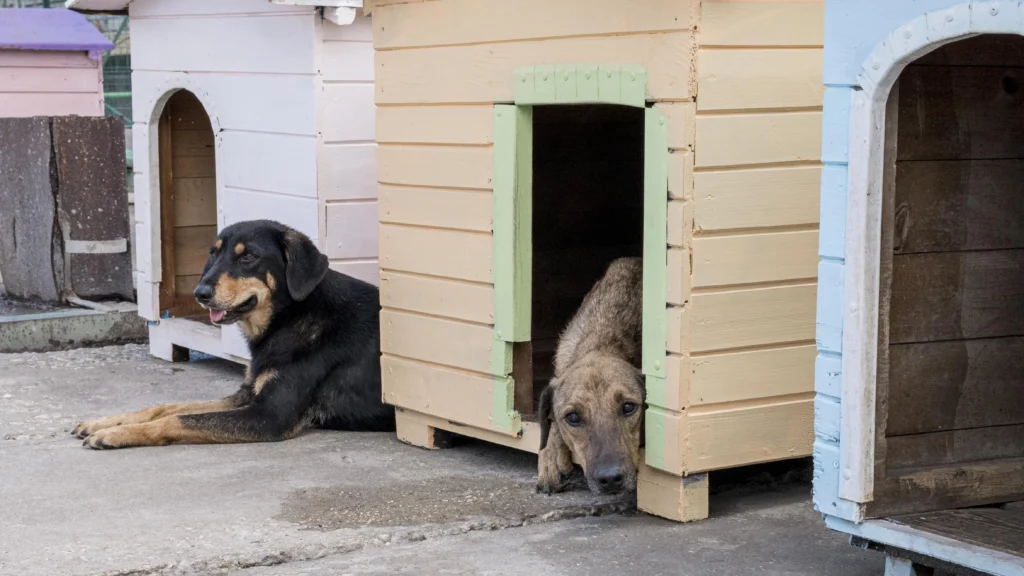
Service and Assistance Dogs
Under Kansas law, “assistance dogs” include guide dogs, hearing assistance dogs, and service dogs trained to perform tasks for individuals with disabilities. These dogs are granted full access to housing accommodations without extra charges.
Emotional Support Animals (ESAs)
Kansas law entitles individuals with disabilities to have an emotional support animal in housing accommodations, even if a “no pets” policy exists. Landlords must make reasonable accommodations for tenants with ESAs and cannot discriminate against them.
Fair Housing Act Protections
The Fair Housing Act protects housing rights concerning emotional support animals. Landlords must allow ESAs in all housing types without imposing additional fees, provided a valid ESA letter from a licensed mental health professional is presented.
Local Housing Policies
- Kansas City, Kansas Housing Authority: The policy states that only one dog or cat is permitted per household. Pets must be kept on a leash, except when inside the owner’s unit. A pet fee and deposit are required for each pet.
Responsibilities of Dog Owners
- Proper Identification: Ensure your dog has proper identification tags and is microchipped.
- Compliance with Local Ordinances: Adhere to specific local regulations regarding the number of pets, leash requirements, and housing fees.
Dog Adoption and Sale Laws in Kansas
Kansas is dedicated to ensuring the ethical treatment and welfare of dogs through its adoption and sale laws. These regulations are in place to protect both the animals and the individuals who welcome them into their homes.
The Kansas Pet Animal Act The cornerstone of dog adoption and sale laws in Kansas is the Kansas Pet Animal Act. This comprehensive legislation covers a range of topics from licensing requirements for breeders to the standards of care for animals.

Key Aspects of the Act
- Licensing: Breeders and facilities selling dogs must be licensed, ensuring adherence to health and safety standards.
- Standards of Care: The act specifies adequate feeding, watering, and housing conditions for dogs.
- Inspections: Regular inspections are conducted to ensure compliance with the act.
Adoption Regulations
- Shelters and Rescues: Facilities like the Hutchinson Animal Shelter and Great Plains SPCA Pet Adoption Center provide adoption services and must comply with state regulation.
- Adoption Processes: Potential adopters are often required to complete applications and may undergo home visits to ensure a suitable match.
Sale Laws
- Consumer Protection: Kansas has “puppy lemon laws” to protect consumers from purchasing unhealthy pets. These laws typically allow buyers to return, exchange, or receive reimbursement for veterinary expenses if a dog is found to have certain illnesses or defects within a specified time after purchase.
- Breeder Regulations: Breeders are required to maintain certain standards of care and are subject to penalties for non-compliance.
Local Ordinances
While the state provides overarching regulations, local municipalities may have additional laws regarding the adoption and sale of dogs. It’s important for individuals to check with local authorities for any specific requirements.
Dog Park and Recreation Laws in Kansas
Kansas offers a variety of dog parks and recreational areas where dogs can play, exercise, and socialize. Understanding the laws and regulations governing these spaces is essential for ensuring a safe and enjoyable experience for all.

Statewide Regulations
While there are no specific statewide statutes governing dog parks, general laws such as the Kansas Pet Animal Act set the foundation for animal welfare and public safety in recreational areas.
Local Dog Park Rules
- Wichita: Dogs must be at least 5 months old, have a valid rabies vaccination, and wear a collar with identification and rabies tags when using the park. Dogs must be leashed when entering or leaving the fenced area.
- Lawrence: Dogs must be on-leash when entering and exiting designated off-leash areas, under the control of their handler, and in view at all times. Handlers must have possession of dog leashes at all times.
Recreational Area Guidelines
- Shawnee Mission Park: Offers a 44-acre dog off-leash area, but dogs must be leashed in other parts of the park. Owners are responsible for their dogs’ behavior and must clean up after them.
- Hesston Dog Park: Provides specific hours for dog-related activities and requires owners to maintain control of their pets and adhere to park rules.
Best Practices for Dog Owners
- Follow Local Ordinances: Always check and comply with the specific rules of the dog park you are visiting.
- Vaccinations: Keep your dog’s vaccinations up-to-date for the safety of all park visitors.
- Supervision: Never leave your dog unattended in a dog park or recreational area.
Dog Food and Nutrition Laws in Kansas
In Kansas, the health and nutrition of pets, particularly dogs, are taken seriously. The state has established laws to ensure that all dog food and treats not only meet nutritional standards but are also safe for canine consumption.

The Kansas Pet Animal Act
The Kansas Pet Animal Act is the primary legislation governing pet food and nutrition in the state. It outlines the requirements for adequate feeding and watering of pets.
Key Provisions for Dog Nutrition
- Adequate Feeding: The act defines adequate feeding as supplying wholesome foodstuff suitable for the dog’s species and age at suitable intervals, not to exceed 24 hours.
- Adequate Watering: Dogs must have access to clean, fresh, potable water, supplied in a sanitary manner at intervals suitable for the species, not to exceed 12 hours.
Regulations for Pet Food Manufacturers
- Licensing: Manufacturers and distributors of pet food in Kansas must be properly licensed.
- Registration: Pet food/treats that provide nutrition and are intended for use as animal food are required to be registered in the State of Kansas prior to distribution.
- Labeling: Pet food labels must be honest and not misleading, providing accurate information about the contents and nutritional value.
Exemptions and Special Cases
- Cottage Foods: Certain homemade or “cottage” pet foods may be exempt from licensing but must still be safe and honestly presented.
- Chews and Bones: Flavor-coated or unflavored chews and bones are exempt from registration requirements.
Consumer Protection
- Safety: All dog food sold in Kansas must be safe for animal consumption and free from harmful contaminants.
- Transparency: Consumers have the right to know what they are feeding their pets, and manufacturers must provide this information clearly.
Dog Health and Veterinary Care Laws in Kansas
Kansas is committed to the health and well-being of dogs within the state. The laws governing dog health and veterinary care are designed to ensure that all dogs receive the necessary care and treatment for a healthy life.
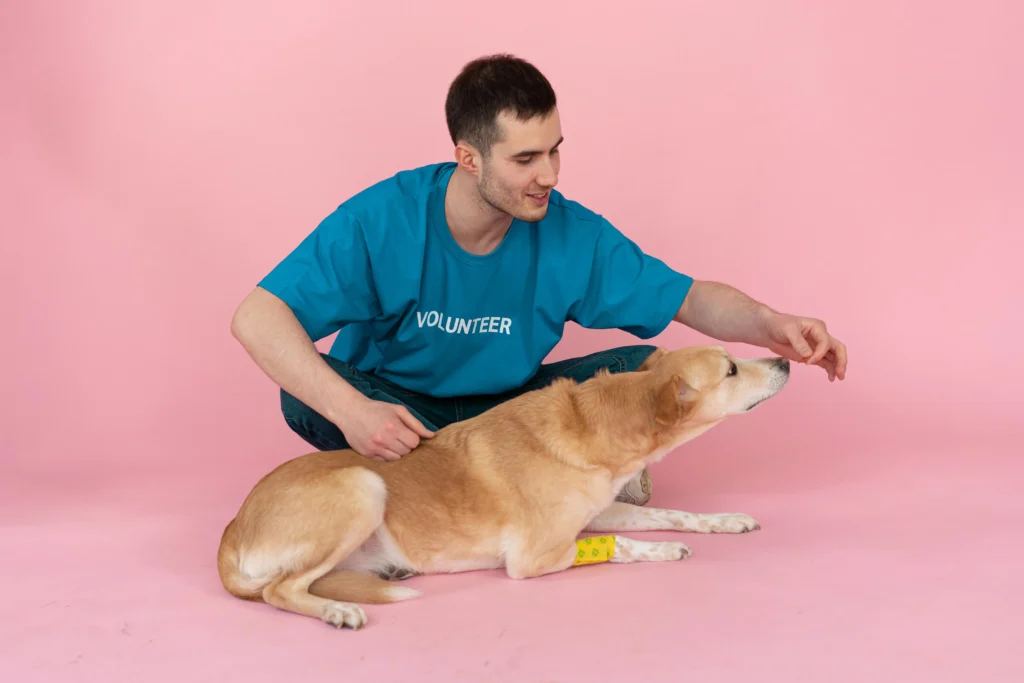
The Kansas Pet Animal Act
The Kansas Pet Animal Act is the primary legislation that outlines the standards for dog health and veterinary care:
- Adequate Feeding and Watering: Dogs must be supplied with wholesome food and clean water at suitable intervals.
- Veterinary Care: Dogs that are diseased, ill, injured, lame, or blind must receive the necessary veterinary care, which should be documented and maintained on the premises.
Preventive Care
- Vaccinations: Dogs are required to be vaccinated against rabies and other diseases as recommended by a licensed veterinarian.
- Parasite Control: Regular treatments for internal and external parasites are encouraged to maintain the dog’s health.
Emergency Care
- Immediate Attention: In cases of injury or sudden illness, dogs must receive prompt veterinary attention.
- Euthanasia: When necessary, the humane destruction of an animal must be performed by a licensed veterinarian or trained personnel using methods that comply with state law.
Breeder and Shelter Regulations
- Health Screening: Breeders and shelters must provide health screenings and veterinary care for dogs in their custody.
- Record Keeping: Accurate records of veterinary care, vaccinations, and treatments must be kept for each dog.
Consumer Protection
- Disclosure: Sellers must disclose the health history and vaccination records to buyers.
- Puppy Lemon Laws: These laws protect consumers from purchasing unhealthy pets, allowing for returns or exchanges if a dog is found to have certain illnesses shortly after purchase.
Dog Identification and Microchipping Laws in Kansas
In Kansas, the identification and microchipping of dogs are not just about reuniting lost pets with their owners; they are crucial components of responsible pet ownership and community safety.

Statewide Identification Requirements
While Kansas does not have a specific statewide law mandating the microchipping of dogs, the Kansas Pet Animal Act sets forth general regulations for the welfare of pets, which can include identification measures.
Microchipping as a Standard Practice
- Veterinary Recommendation: Many veterinarians in Kansas recommend microchipping as a reliable form of permanent identification.
- Shelter Policies: Animal shelters often microchip dogs before adoption to increase the chances of recovery if lost.
Local Ordinances
Some Kansas municipalities may have local ordinances requiring dog identification:
- Kansas City: While not explicitly mandating microchipping, local laws may require dogs to wear identification tags with the owner’s contact information when in public spaces2.
Benefits of Microchipping
- Recovery of Lost Pets: Microchipped dogs are more likely to be returned to their owners if lost.
- Proof of Ownership: Microchips can serve as legal proof of ownership in disputes.
- Travel and Boarding: Many boarding facilities and international travel regulations require dogs to be microchipped.
Microchipping Process
- Procedure: A veterinarian or trained professional inserts a microchip, about the size of a grain of rice, under the dog’s skin, typically between the shoulder blades.
- Registration: The microchip must be registered with the owner’s current contact information in a national pet recovery database.
Dog Breeding and Genetics Laws in Kansas
Kansas is dedicated to promoting responsible dog breeding practices and maintaining the genetic health of dogs. The state’s laws are designed to ensure ethical breeding and protect the welfare of all dogs.

The Kansas Pet Animal Act
The Kansas Pet Animal Act is the primary legislation that governs dog breeding and genetics in the state:
Licensing Requirements
Breeders must obtain a license, ensuring they meet the standards for the health and safety of the dogs.
Standards of Care
The act specifies adequate feeding, watering, and housing conditions for dogs, which are essential for maintaining their genetic health.
Inspections
Regular inspections are conducted to ensure compliance with the act, including the health and genetic integrity of the breeding stock.
Genetic Testing and Breeding Practices
- Health Screening: Responsible breeders are encouraged to perform genetic testing to screen for hereditary conditions.
- Breeding Records: Breeders must maintain accurate records of breeding pairs, litters, and medical histories.
Consumer Protection
- Disclosure: Breeders are required to disclose the genetic health of the dogs to potential buyers.
- Puppy Lemon Laws: These laws protect consumers from purchasing dogs with undisclosed genetic diseases, allowing for returns or exchanges if a dog is found to have certain hereditary conditions shortly after purchase.
Local Ordinances
Some municipalities in Kansas may have additional regulations regarding dog breeding and genetics:
- Kansas City: Local laws may require breeders to follow specific guidelines to prevent the spread of genetic diseases2.
Dog Environmental Impact Laws in Kansas
Kansas recognizes the importance of minimizing the environmental impact of pets, including dogs. The state has implemented laws to ensure that dog ownership is compatible with environmental stewardship.

The Kansas Pet Animal Act
The Kansas Pet Animal Act1 provides the framework for pet animal welfare and includes provisions that indirectly affect environmental impact:
- Adequate Feeding and Watering: Ensures that dogs are fed and watered in a manner that minimizes waste and contamination.
- Waste Management: Requires pet facilities to manage animal waste properly to prevent environmental pollution1.
Local Ordinances
- Waste Disposal: Many municipalities have specific regulations requiring dog owners to pick up and properly dispose of their pet’s waste to maintain public health and sanitation.
- Leash Laws: By keeping dogs on leashes in public areas, localities reduce the chance of environmental damage caused by dogs roaming freely.
Environmental Health and Safety
- Water Quality: Laws are in place to protect water sources from contamination by animal waste, which can contribute to harmful algal blooms and waterborne diseases.
- Public Parks and Recreation Areas: Regulations often include rules about dogs in these areas to preserve the natural environment and wildlife.
Best Practices for Dog Owners
- Eco-Friendly Products: Use biodegradable waste bags and eco-friendly pet care products.
- Sustainable Pet Ownership: Consider adopting from shelters and rescuing dogs to reduce the environmental impact associated with large-scale breeding operations.
Dog Behavioural Training Laws in Kansas
Kansas values the role of dogs in society and promotes responsible dog ownership through behavioral training laws. These laws are designed to ensure that dogs are well-behaved members of the community.
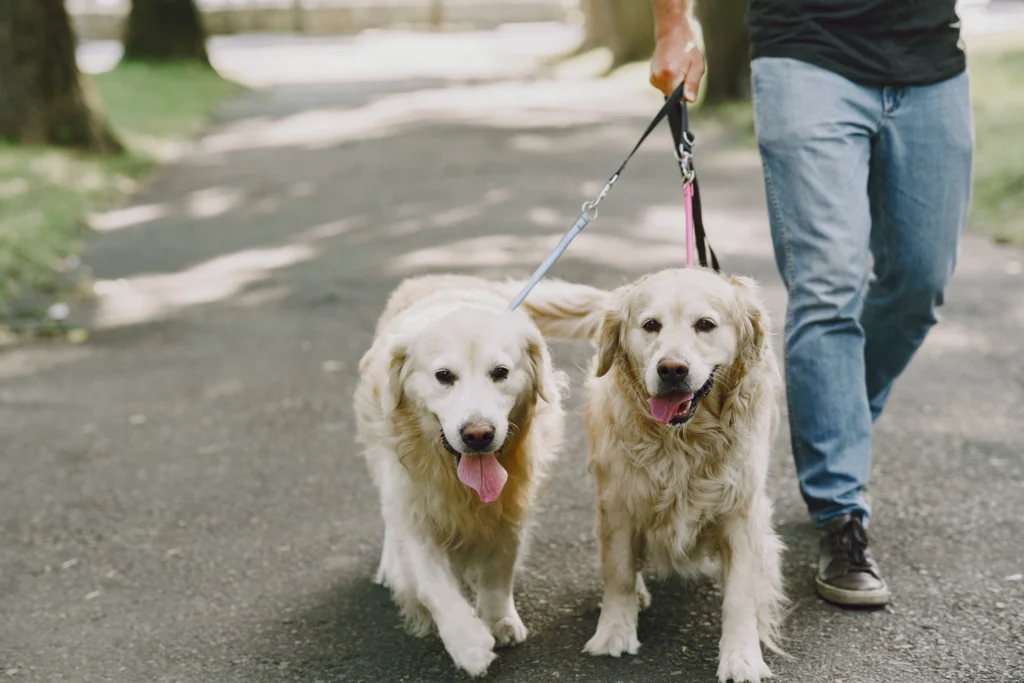
The Kansas Pet Animal Act
The Kansas Pet Animal Act1 sets the stage for pet animal welfare in the state, which includes aspects of dog training:
- Licensing for Trainers: Professional dog trainers may be required to obtain a license, ensuring they meet certain standards of knowledge and care.
- Standards of Care: The act mandates that dogs receive humane treatment during training, which includes proper handling and avoidance of any cruel practices.
Regulations for Dog Training Facilities
- Commercial Dog Training: Facilities offering commercial dog training must adhere to specific regulations, including obtaining a permit and following proper animal welfare guidelines.
- Non-Commercial Dog Training: Non-commercial training activities are also regulated to ensure the safety and well-being of the dogs involved.
Field Trial Events
- Permits for Field Trials: Special events involving dog training, such as field trials, require permits, and must comply with regulations to protect natural resources and wildlife.
Consumer Protection
- Disclosure: Dog trainers are required to inform clients about the training methods used and any risks involved.
- Record Keeping: Trainers must keep records of the dogs’ progress and any incidents during training sessions.
Local Ordinances
- Municipal Regulations: Cities and counties in Kansas may have additional ordinances governing dog training, such as leash laws and noise control.
Best Practices for Dog Owners
- Choosing a Trainer: Select trainers with a positive track record and humane training methods.
- Participation: Owners are encouraged to be involved in the training process to ensure consistency and reinforce learning.
Dog Protection and Rescue Laws in Kansas
Kansas has a strong commitment to the protection and rescue of dogs. The state’s laws are designed to safeguard dogs from abuse, neglect, and abandonment, ensuring they live in safe and humane conditions.

The Kansas Pet Animal Act
The Kansas Pet Animal Act1 is a comprehensive piece of legislation that covers various aspects of animal welfare, including the protection and rescue of dogs:
- General Cruelty: It is illegal to mistreat or neglect dogs, and such actions are subject to legal penalties.
- Seizure and Disposition: The act allows for the seizure of animals in distress and outlines the procedures for their care and disposition.
Animal Protection Laws
- Cruelty Prohibitions: Kansas law prohibits cruelty to animals, defining it as knowingly abandoning, torturing, or cruelly beating or mutilating an animal.
- Fighting and Racketeering: Dogfighting is strictly prohibited and considered a felony offense. Possession of dogfighting paraphernalia is also illegal.
Rescue Operations
- Shelter and Pound Licensing: Shelters and pounds are required to be licensed, ensuring they provide proper care for rescued dogs.
- Emergency Services: Law enforcement and animal control officers are empowered to intervene in cases of animal cruelty or distress.
Protection for Service Dogs
- Special Status: Service dogs, including police, arson, assistance, game warden, and search and rescue dogs, are granted special protection under the law. Harming these dogs is considered a felony.
Veterinarian Reporting and Immunity
- Mandatory Reporting: Veterinarians are required to report suspected animal cruelty and are granted immunity from liability for making such reports.
Dog Entertainment and Work Laws in Kansas
In Kansas, dogs are not only beloved pets but also partners in work and entertainment. The state has established laws to ensure that dogs engaged in these activities are treated humanely and with respect.
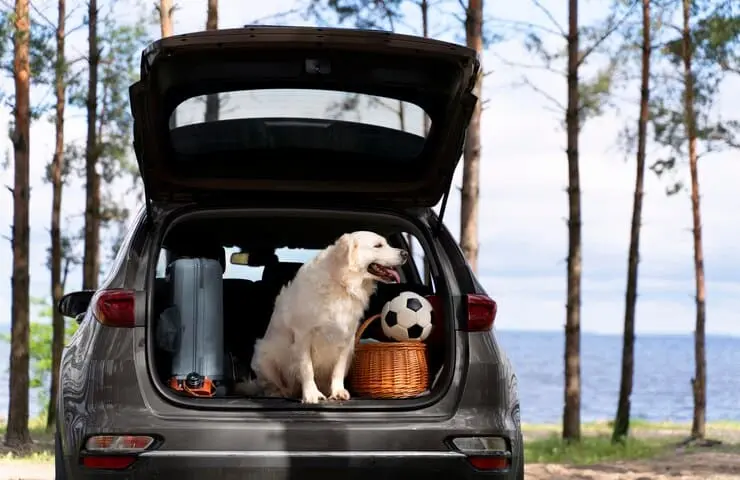
The Kansas Pet Animal Act
The Kansas Pet Animal Act is the cornerstone of legislation for dogs involved in entertainment and work in Kansas:
- Licensing: Any person or entity using dogs for entertainment or work must obtain the appropriate license, ensuring adherence to animal welfare standards.
- Standards of Care: The act mandates adequate feeding, watering, and humane treatment, which extends to dogs used in entertainment and work.
Regulations for Dog Training and Field Trials
- Non-Commercial Dog Training: Individuals or groups training dogs for non-commercial purposes must follow specific guidelines to ensure the safety and well-being of the animals.
- Field Trial Permits: Special permits are required for field trials involving small game, furbearers, and coyotes, ensuring that these activities do not negatively impact the environment or the dogs.
Service Dog Laws
- Access Rights: Service dogs, including those used for assistance, police, and search and rescue, are granted full access to public accommodations under state law.
- Protection: Harming or interfering with the duties of a service dog is prohibited and subject to legal penalties.
Entertainment Industry Considerations
- Performance Animals: Dogs used in performances, such as shows or circuses, must be provided with proper care, and their use must comply with animal welfare regulations.
- Film and Television: Dogs appearing in film or television must be handled according to industry standards for animal actors, ensuring their safety and humane treatment.
Work-Related Laws
- Working Dogs on Farms: Dogs used for herding or guarding livestock must be provided with adequate shelter, food, and water, and must not be overworked.
- Police and Security Dogs: Law enforcement agencies using dogs must ensure they receive proper training, care, and rest periods.
Dog Technology and Innovation Laws in Kansas
Kansas is at the forefront of embracing technology and innovation in canine care. The state’s laws reflect a commitment to integrating modern solutions for the health and well-being of dogs.

The Kansas Pet Animal Act
The Kansas Pet Animal Ac1 is the primary legislation that addresses the welfare of pets, including the use of technology and innovation in canine care:
- Licensing and Regulation: The act requires all pet animal facilities, which could include those offering technological services for dogs, to be licensed and adhere to state regulations.
- Standards of Care: While the act does not specify technology use, it mandates adequate care that could encompass modern veterinary practices and innovative health solutions.
Technology in Veterinary Medicine
- Telemedicine: Kansas allows for the use of telemedicine in veterinary practices, enabling remote consultations and monitoring of a dog’s health.
- Innovative Treatments: The state supports the use of advanced treatments and surgeries that utilize cutting-edge technology for canine care.
Pet Tech Products
- Regulation of Pet Tech Products: While specific laws for pet tech products are not detailed, general consumer protection laws apply, ensuring that products are safe and effective.
- Use in Animal Shelters: Technology such as microchipping and database tracking is encouraged to improve the management and recovery of lost pets.
Data Protection and Privacy
- Confidentiality: Any technology that collects data on dogs and their owners is subject to privacy laws, ensuring that personal information is protected.
Emerging Technologies
- Wearable Devices: Devices that monitor a dog’s activity levels, vital signs, and location are becoming increasingly popular and are subject to consumer safety regulations.
- Genetic Testing: Genetic testing services for dogs must comply with state regulations regarding animal welfare and ethical standards.
Human Coexistence Laws in Kansas
Kansas recognizes the special bond between humans and dogs and has established laws to promote harmonious cohabitation. These laws aim to protect both parties and foster a safe and respectful environment for all.

Strict Liability in Dog Bite Cases
Kansas follows a “strict liability” approach in dog bite incidents, holding dog owners responsible for any injuries caused by their dogs, regardless of the dog’s previous behavior or the owner’s knowledge of their dog’s vicious tendencies. This law underscores the importance of responsible pet ownership and the safety of the community.
Statute of Limitations
Victims of dog bites have two years from the date of the incident to file a lawsuit in Kansas. This statute of limitations ensures timely resolution and reinforces the significance of accountability in human-canine interactions.
Defenses for Dog Owners
While strict liability is the norm, dog owners in Kansas can invoke defenses such as trespassing, provocation, and comparative negligence if the victim provoked the dog or was trespassing at the time of the incident.
Local Regulations
Municipalities in Kansas may enact ordinances that supplement state laws, such as leash laws and confinement requirements. These local regulations are crucial for preventing incidents and ensuring public safety.
Promoting Positive Interactions
- Educational Programs: Kansas encourages educational programs that teach safe interaction with dogs, emphasizing the prevention of bites and attacks.
- Community Events: Dog-friendly community events are supported to enhance the bond between dogs and humans and to educate the public on cohabitation laws.
Other Relevant Dog Laws in Kansas
Canine Good Citizen Programs and Legal Benefits in Kansas
- The Canine Good Citizen (CGC) Program is recognized nationwide and in Kansas. It’s designed to reward dogs who have good manners at home and in the community.
- While there are no direct legal benefits in Kansas for CGC certification, it may be beneficial in legal situations to show a dog’s good behavior and the owner’s responsible pet ownership.
Dog Insurance and Coverage Laws in Kansas
- Dog insurance is not mandated by law in Kansas, but it’s a prudent choice for pet owners to cover unexpected veterinary expenses.
- Some homeowner’s insurance policies may offer coverage for dog-related incidents, but this can vary based on the breed and history of the dog.
Laws Regarding Dogs in Hot Cars and Animal Endangerment in Kansas
- Kansas law provides immunity from civil liability for individuals who damage a vehicle to rescue a “vulnerable person or domestic animal” in imminent danger, provided law enforcement has been notified.
Legal Aspects of Dog Parks and Shared Spaces in Kansas
- Dog parks and shared spaces must adhere to local regulations, which can include leash laws and rules about picking up after your pet.
- Specific breed restrictions may apply in certain areas, so it’s important to check local ordinances.
Dog-Related Property Damage and Homeowner’s Insurance in Kansas
- Generally, homeowner’s insurance policies do not cover damage caused by the policyholder’s own pets.
- Liability coverage may protect against dog-related injuries or damage to others’ property, subject to the terms of the policy.
Service and Working Dog Laws in Employment and Public Access in Kansas
- Service dogs are allowed in public accommodations and may be considered a reasonable accommodation in the workplace under the ADA.
- Kansas law defines service animals and includes guide dogs, hearing assistance dogs, and service dogs trained to perform tasks for those with disabilities.
Animal Welfare and Protection Laws Against Neglect and Abandonment in Kansas
- Kansas has laws against cruelty to animals, which include provisions against neglect, abuse, and abandonment.
- The Kansas Pet Animal Act includes regulations for the care and treatment of pets, including seizure and disposition of animals in cases of neglect or danger to the community.
In conclusion, the comprehensive overview of Kansas’s dog laws underscores the state’s dedication to fostering a society where dogs are safe, healthy, and well-integrated into the community. From strict liability in dog bite cases to humane treatment in dog breeding and entertainment, these laws reflect a deep understanding of the multifaceted relationship between dogs and humans. The Kansas Pet Animal Act serves as the cornerstone, ensuring welfare standards across various contexts, including veterinary care, microchipping, and responsible breeding practices.
Compliance with these laws is not only a legal obligation for dog owners but also a cornerstone of civil responsibility. It ensures the safety of both pets and the public, promotes humane treatment, and supports the well-being of dogs. For society, these laws mitigate risks, reduce conflicts, and enhance the quality of life for all. Adhering to these regulations signifies a commitment to ethical pet ownership and contributes to a harmonious coexistence between humans and their canine companions.
FAQs
What are the requirements for registering a dog in Kansas?
In Kansas, dog registration requirements vary by locality. Generally, owners must provide proof of rabies vaccination and may need to pay a registration fee. It’s best to check with local animal control for specific regulations.
Is there a limit to the number of dogs I can own in Kansas?
While Kansas state law does not specify a limit, local ordinances might. Cities and counties can set their own limits on the number of dogs per household, so it’s important to consult local regulations.
Are there breed-specific laws in Kansas?
Kansas does not have statewide breed-specific legislation (BSL); however, individual municipalities may have ordinances that regulate or ban specific breeds. Always verify with local authorities to ensure compliance.
What should I do if my dog is lost in Kansas?
If your dog is lost, contact local animal shelters, file a lost pet report, check with neighbors, and consider posting on community social media groups. Microchipping and proper identification tags increase the chances of a reunion.
How are service dogs defined and regulated in Kansas?
Service dogs in Kansas are defined as dogs trained to perform specific tasks for individuals with disabilities. They are protected under the Americans with Disabilities Act (ADA) and are allowed in public spaces where pets are typically not permitted.

